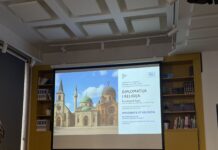A proposal to reorganize the Department of State is due later this month. Secretary Rex Tillerson called for it, and teams in State and USAID have been working on the “redesign.” How this will affect public diplomacy is not known; PD is not one of the primary topics singled out for attention after a consultancy’s report based on an online survey of Department employees.
The White House’s budget request for the Department, which some might call a more telling statement, called for drastic reductions in educational and cultural affairs and foreign aid.
Tillerson’s redesign just got some major pushback.
First, the Atlantic Council just issued its own report on how the Department should be reorganized, saying:
“Public Diplomacy should be considered to form a stand-alone agency within the department somewhat like USAID. Because of different skills required, especially in program management and information operations, it should have its own personnel, assignments process, budget, and so forth. It would report to the secretary.”
My PDC colleague Michael Anderson points out:
“What makes the report stand out a wee bit from the usual think-tank study is that the idea for it came from House Foreign Affairs Committee Chairman Ed Royce, and he turned out at the launch event to show his general support of reforms and the work of the Atlantic Council group.”
Anderson, who attended the launch of the report, adds:
“Washington Post columnist David Ignatius, who was the moderator, asked Ambassador Pickering specifically about the public diplomacy recommendation. Pickering responded saying that the group favored borrowing a tradition from the Pentagon of creating stand-alone agencies — one for public diplomacy and one for assistance, and having their leaders report to the Secretary.”
The authors include luminaries like Thomas Pickering and Chester Crocker, who deliver a thorough rationale for organizational reform going well beyond moving boxes on the chart. A clear, public rationale has been missing so far from the Tillerson effort. (Tillerson did recently announce a reduction of special envoys that pointed to the accumulation of offices answering directly to the Secretary. That looked to me like a sensible housecleaning for the most part.)
And now Congress wants a say. Diplopundit reports that the Senate Appropriations Subcommittee on State, Foreign Operations and Related Programs, in its appropriations bill announced yesterday rejected nearly all of the White House’s cuts. The subcommittee report endorsed the importance of “soft power” and demanded the Congress be notified of proposed changes at State. The bill also requires that the Government Accountability Office and inspectors-general of State and USAID review the redesign plans.
We’re now about to enter a public debate on how 21st Century diplomacy should look, and soft power — including public diplomacy — is likely to get plenty of attention.
![]()



 A proposal to reorganize the Department of State is due later this month.
A proposal to reorganize the Department of State is due later this month.









